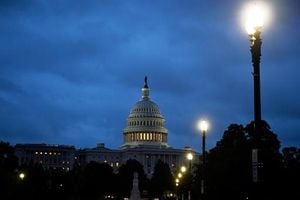Deputy Prime Minister Angela Rayner is facing intense scrutiny and calls for an ethics investigation after a series of reports revealed she saved £40,000 in stamp duty when purchasing a flat in Hove, East Sussex. The controversy, brought to light by The Daily Telegraph and subsequently amplified by multiple media outlets, centers on Rayner’s designation of her new seaside property as her main residence for tax purposes, a move that allowed her to avoid the higher stamp duty rate typically applied to second homes.
Conservative Party chairman Kevin Hollinrake has been at the forefront of the campaign, formally writing to Sir Laurie Magnus, the Prime Minister’s independent adviser on ministerial standards, urging an inquiry into whether Rayner’s actions breached ministerial rules. Hollinrake did not allege any illegality but described Rayner’s arrangements as “hypocritical tax avoidance, by a minister who supports higher taxes on family homes, high-value homes and second homes,” as reported by Sky News. He argued that, as Secretary of State for Housing, Communities and Local Government, Rayner’s personal conduct on housing-related tax matters merits a higher standard of transparency and integrity.
At the heart of the dispute is the way Rayner managed her property portfolio. Before buying the £800,000 Hove flat, Rayner removed her name from the deeds of her family home in Ashton-under-Lyne, Greater Manchester. By doing so, she was able to declare the new Hove property as her main residence to HM Revenue & Customs, thus avoiding the additional 5% stamp duty surcharge for second homes introduced by the government’s latest Budget. According to BBC and The Telegraph, Rayner paid £30,000 in stamp duty instead of the £70,000 she would have owed had the flat been classified as a second home.
The controversy deepened when it emerged that Rayner continued to list her Ashton-under-Lyne home as her primary residence for council tax purposes, despite no longer owning a share in the property following her divorce. This move allowed her to save around £2,000 in council tax on her grace-and-favour flat at Admiralty House in central London, which she occupies as Deputy Prime Minister. The arrangement, while reportedly legal, has been criticized as inconsistent and potentially misleading. Hollinrake claimed, “She is paying second homes council tax to Brighton and Hove council on a property that she tells HMRC is not a second home. This may be lawful, but it is inappropriate tax avoidance for a minister subject to higher standards of conduct.”
Rayner’s spokesperson has repeatedly defended her conduct, stating, “The Deputy Prime Minister paid the relevant duty owing on the purchase of the Hove property in line with relevant requirements and entirely properly. Any suggestion otherwise is entirely without basis.” The Cabinet Office has also weighed in, asserting that Rayner “has followed advice on the allocation of her official residence at all times.” Health Minister Stephen Kinnock publicly supported Rayner, telling LBC, “The deputy prime minister has made it absolutely clear she’s done absolutely nothing wrong. Everything that she’s done is fully within the law.”
However, the Conservatives argue that the case is not merely about legal compliance but about ministerial ethics and public trust. Hollinrake’s letter to Sir Laurie Magnus contends that Rayner’s multiple and seemingly contradictory statements about her primary residence “collapse the house of cards that Tameside is her primary home.” He further suggested that Rayner should recuse herself from all government decisions relating to council tax and second homes, given her “skin in the game.” In the event of a breach of the Ministerial Code, Hollinrake recommended that possible sanctions could include stripping Rayner of her ministerial residence or requiring her to personally pay council tax on the grace-and-favour flat in London.
The issue of residency has also spilled into the realm of electoral registration. The Conservatives have contacted Tameside Council, requesting that Rayner be removed from the electoral roll on grounds that she does not maintain a permanent residence in the area. They pointed out that Rayner is registered at three addresses: Ashton-under-Lyne, London, and Hove. According to the Electoral Commission, individuals can register at more than one address if they can demonstrate actual residency at both, but mere ownership or council tax payments do not suffice as proof.
Labour’s internal response has been mixed. While Labour leader Sir Keir Starmer has expressed continued confidence in his deputy, some Labour MPs have voiced concerns about the optics of the situation. One MP, speaking anonymously to The Telegraph, remarked, “It really doesn’t look good. For ordinary people who are struggling, it doesn’t correspond to how people live their lives.” Another Labour colleague commented that Rayner “could have shut this all down by just being more transparent.”
The matter has also raised questions about transparency and consistency in public life. Rayner has previously campaigned against tax avoidance and called for ethics inquiries into political opponents. As an MP, she once stated, “The public are furious with those who get away with tax avoidance while they pay.” This history has fueled accusations of hypocrisy from political adversaries, with Dame Priti Patel, the shadow foreign secretary, branding Rayner “a hypocrite and a freeloader.”
Adding another twist, The Times reported that the Land Registry could not confirm whether Rayner had formally removed her name from the Ashton-under-Lyne property’s deeds, despite an application being made. Sources close to Rayner maintain that she divorced her husband and “ceased to own a stake” in the family home before purchasing the Hove flat, and that she continues to visit her children at the Ashton-under-Lyne residence. Nevertheless, some neighbors have reportedly said they rarely saw her at the property.
As the political fallout continues, the decision now rests with Sir Laurie Magnus on whether to launch a formal investigation into Rayner’s tax arrangements and potential breaches of the Ministerial Code. The outcome could have significant implications not only for Rayner’s political future but also for the government’s handling of tax policy and public trust in ministerial conduct. For now, the case stands as a vivid reminder of the fine line between legal compliance and ethical responsibility in public office.





